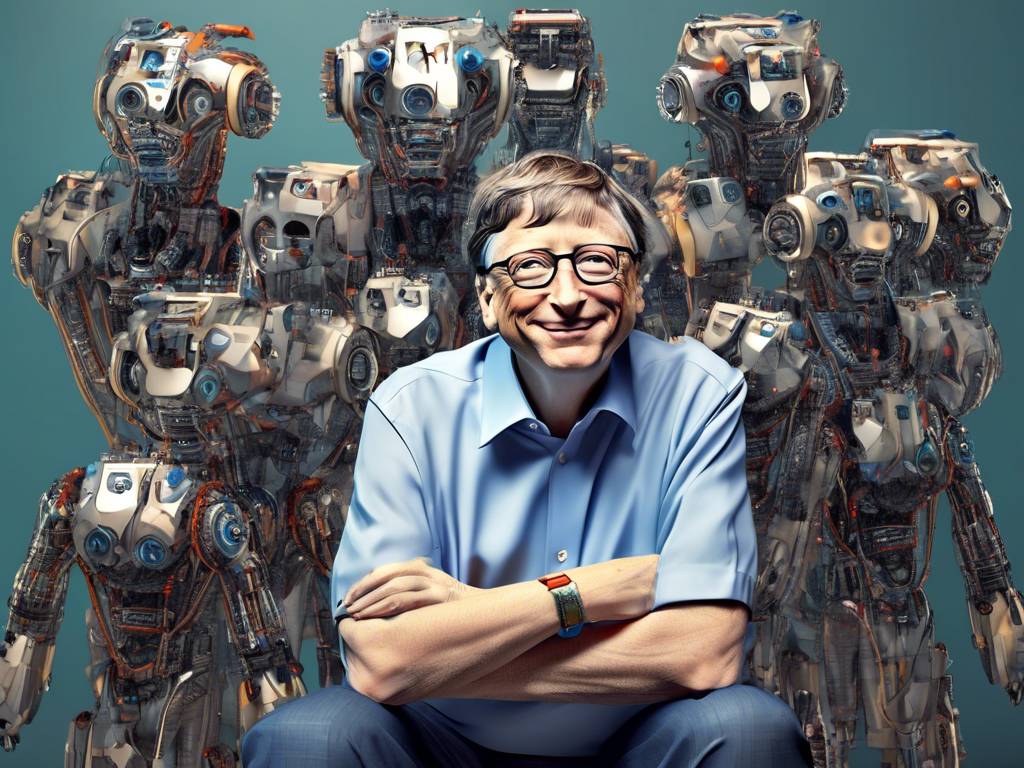Bill Gates: AI Will Revolutionize Global Economy in the Next Few Years
Microsoft co-founder Bill Gates believes that artificial intelligence (AI) will have a transformative impact on vital sectors of the global economy within the next two to three years. Gates made these remarks during an interview on the “Armchair Expert” podcast. He stated that while the current developments in AI are still in their early stages, agricultural AI, health advice AI, and drug discovery AI will become significant in the near future.
Gates explained that AI’s ability to process large amounts of data and provide tailored recommendations quickly will be game-changing. He compared AI to a free worker that can scan vast quantities of information and offer valuable advice across various fields, from technical support calls to career guidance.
During the podcast, Gates also discussed Microsoft’s involvement in AI. The company has made substantial investments in OpenAI, integrating artificial intelligence into its software tools. Gates emphasized that he is still actively engaged with Microsoft and has been involved in discussions about the rise of AI.
The Potential of AI
Gates highlighted several areas where AI has already shown promise:
- Global Challenges: The Bill & Melinda Gates Foundation is using AI to tackle major issues such as child mortality, malaria, and agricultural productivity. For example, AI can analyze nitrogen levels in crop forecasts and provide farmers with recommendations to address vulnerabilities.
- Education and Therapy: Gates sees great potential for AI in fields like education, therapy, and caregiving. He believes that AI could play a role in mental counseling by providing immediate availability and sympathetic responses, escalating certain circumstances to human experts when necessary.
Gates acknowledged that there are challenges associated with the rapid development of AI:
- Data Flaws: Dax Shepard, one of the podcast hosts, expressed concerns about using AI to address human problems due to the subjective nature of social science data. Gates agreed that AI’s current techniques may not be sufficient for tackling such issues and emphasized the need for data that embodies expertise.
- Societal Reorganization: Gates pointed out that society will need to rethink its concept of time and priorities in the age of AI. He also highlighted the potential disparities between countries and communities that embrace or resist AI, which could lead to uneven distribution of benefits and challenges.
Gates’ Perspective on AI Assistance
Gates shared his perspective on the role of highly capable AI assistants:
While Gates is proud of his work on global health and development, he acknowledged that if AI assistants could perform these tasks more effectively, he would be fine with stepping back. He used malaria eradication as an example, stating that if a machine could do a better job, he would let it take over while he focused on other activities like playing pickleball and listening to jokes.
Affection for India and Reflections on Life
The interview was recorded during a Gates Foundation trip to India. Gates expressed his admiration for the country’s vibrancy and reflected on the valuable lessons learned from visiting different parts of the world. He emphasized the importance of appreciating what we have, even in troubled times, and how traveling can provide a fresh perspective.
The conversation also touched on lighter topics such as Gates’ sleep habits and his love for activities like pickleball, Wordle, and bridge.
Hot Take: The Transformative Power of AI
Bill Gates believes that artificial intelligence is on the cusp of revolutionizing various sectors of the global economy. He predicts that within the next few years, agricultural AI, health advice AI, and drug discovery AI will become significant players. Gates sees AI as a valuable tool that can process vast amounts of data and provide tailored recommendations quickly.
While acknowledging the challenges associated with AI’s development, Gates remains optimistic about its potential. He believes that AI can contribute to solving global challenges such as child mortality and malaria. Additionally, he sees opportunities for AI in fields like education and therapy, although caution is necessary to ensure proper implementation.
Gates also shared his perspective on the role of highly capable AI assistants, stating that if they could perform tasks more effectively than humans, he would be open to stepping back and allowing them to take over.
Overall, Gates’ insights highlight the transformative power of AI and its potential to shape the future of various industries. However, he also emphasizes the need for careful consideration and ethical considerations as society embraces this technology.





 By
By

 By
By

 By
By